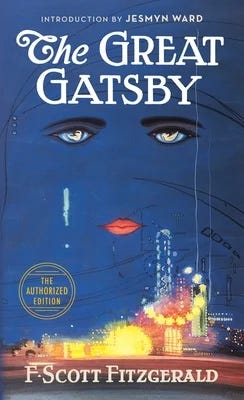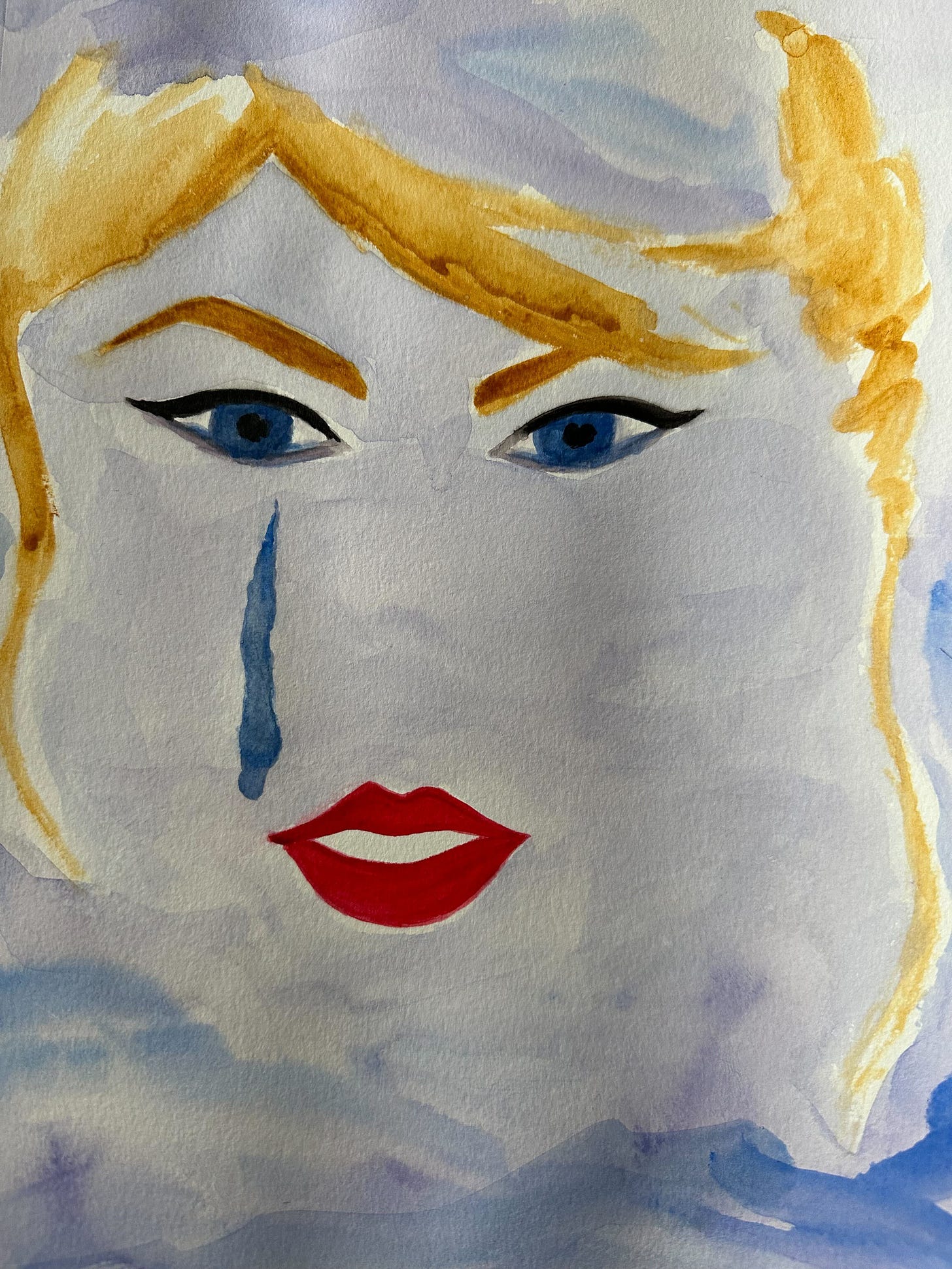Champagne. A crowd of strangers. Beautiful people dancing to beautiful music. Turns out extravagant New Year’s Eve parties and the parties in The Great Gatsby have a lot in common! To celebrate ringing in the new year, in this week’s episode we discuss three Taylor Swift songs that we could connect to The Great Gatsby by F. Scott Fitzgerald. Tune in to see how we connect “This is Why We Can’t Have Nice Things,” “Death By A Thousand Cuts,” and “happiness” to this classic American novel.
Take a sneak peek at this week’s episode!
Help spread AP Taylor Swift!
Want to see more discourse about Taylor Swift’s art and less about her personal life? Help us spread the word about AP Taylor Swift by following, rating, reviewing, and sharing our podcast!
Today’s extra credit - brought to you by Jenn
The Great Gatsby and I have a complicated relationship. It’s honestly not my favorite book (personally, I would identify The Invisible Man by Ralph Ellison as the best American novel); however, The Great Gatsby and I have spent a LOT of time together. It’s rather simple to read, but has enough symbolism and layers that every time I taught a literature course, this book made it onto the syllabus. Every time I taught it, I actually quite dreaded having to revisit the story yet again, and then every year, my students would bring a new viewpoint, argument, or interpretation that changed the way I saw the novel and reminded me why I taught it in the first place.
Usually it was one of the last books we would read, and it was by this point in the semester my students would start to actually believe that I didn’t care about them parroting my opinions about literature, but rather that I wanted to see them develop their own opinions and then support their claims with evidence. This accessible but highly symbolic book was the perfect place for my class to start asserting their differing opinions, and I can honestly say that every year at least one student would bring an interpretation that changed the way I saw the story or the characters. In honor of that, I wanted to use this extra credit to share some of my favorite student interpretations of The Great Gatsby.
Celebrity & cancel culture are nothing new
We discuss this in the podcast, but one of the more jarring scenes of the novel is when nobody shows up to Gatsby’s funeral. Hundreds of people benefited from his generosity in throwing these elaborate parties, but after he is literally murdered, no one shows an ounce of sympathy.
One year, a student made the connection between this and the modern culture around celebrity and cancel culture. This student pointed out that everyone knew Gatsby was engaging in illegal activity, but they were happy to turn a blind eye when he was mysterious and they benefitted from his wealth. However, as soon as it was no longer fashionable to be a “fan” of Gatsby, everyone simply disappeared. While accountability for public figures is certainly important, the story of Gatsby centers the person of Gatsby in the story, which inevitably changes the way readers view this “cancellation.”
I love this connection from the student, because it helps highlight the importance of point of view. If the story was told from the viewpoint of one of the party goers, readers likely wouldn’t sympathize with Gatsby at all. But by telling it from Nick’s point of view who is close to Gatsby, the story feels much more tragic. We also discussed how fascination with celebrity is a fairly universal experience at this point in society, but The Great Gatsby reminds us of the innate humanness in even the most mysterious and famous people. Gatsby’s death reminds us that at the end of the day, he was simply a man.
Nick is a gay man
Ok so this is actually a pretty widely accepted interpretation of the story that I somehow missed up until a student pointed it out to me. And thank goodness I had missed it, because this was one of my favorite student moments ever. I had a student who was a member of the LGBTQ+ community himself share this viewpoint in class. He was kind of dismissed by some of his friends because “of course” he would read it that way, but I was intrigued. I asked him to share his evidence and he pointed out a few passages to me. At the end of the conversation, I was sold. Not only did he point out a new interpretation I thought was valid, he changed my mind and that is absolutely how I read the story now. I loved this moment because it was great to validate a student, but the rest of the class was much more open about their opinions afterwards because they saw that with good evidence and a solid argument, even I could change my mind no matter how many times I had read the story.
So what are the passages people point to as evidence for this take? Well in general, if you compare the way Nick describes Gatsby vs the way he describes any of the women, the descriptions of Gatsby are much more physically favorable. While that was a valid argument itself, perhaps the most compelling piece of evidence is what happens with Nick after leaving Myrtle’s apartment.
Then Mr. McKee turned and continued on out the door. Taking my hat from the chandelier, I followed.
“Come to lunch some day,” he suggested, as we groaned down in the elevator.
“Where?”
“Anywhere?”
“Keep your hands off the lever,” snapped the elevator boy.
“I beg your pardon,” said Mr. McKee with dignity, “I didn’t know I was touching it.”
“All right,” I agreed. “I’ll be glad to.”
…I was standing beside his bed and he was sitting up between the sheets, clad in his underwear, with a great portfolio in his hands.
This short passage is easy to skip over or simply brush aside as drunken antics, but if you sit with it for even a few moments, it becomes a pretty strong piece of evidence for this argument. “Lever” could be a lever, or it could be something else. Additionally, the scene cuts to Mr. McKee in bed in his underwear. We don’t know how we got to this moment, but we can definitely infer a few things.
If this is an interesting interpretation to you and you want to dig in more, check out this article for more: “The Queering of Nick Carraway.”
Nick Carraway is the villain
It’s probably worth noting that this hot take came from a completely different class than the one above, so it was entirely unrelated to Nick’s sexuality. However, I once had a student who absolutely despised Nick. I definitely have some opinions about Nick myself (listen to the episode to hear more!), but this student was convinced Nick was the true antagonist in this story. Most people would consider Tom to be the antagonist to Gatsby’s protagonist, but the novel doesn’t have to be read that way.
This student’s main argument was that Nick is the most dishonest about who he is. We get that in the beginning of the story when he talks about how you shouldn’t judge people and then proceeds to judge everyone in the story. Not only that, but he seems to consider himself to be the most moral person in their little group, but he is fully aware of every terrible, hurtful thing that is happening in the group, and his only chosen action is to judge silently. According to my student, Tom, Daisy, and Gatsby aren’t great people either, but they never pretend to be anything they are not. Nick’s actions constantly conflict with his words, and his lack of moral action firmly cemented him as the villain for this student.
I’m not sure I’d go as far as the student did with “villain” personally, but she had solid evidence for this point. If any other character narrated this story, they likely would have told it in a way that tried to make themselves seem like the good, rational person. The limited narrator means he isn’t quite trustworthy, so questioning his motives and the role he casts for himself is a great way to engage with this novel.
What do you think?
One of the things I miss the most about the classroom is moments like the ones above. I love hearing different takes on literature (or any form of art). Every person brings their own unique experiences with them when they engage with art, and those unique experiences lead to unique interpretations. Art is so much fuller and richer when you get to see it through a wider lens. We’d love to hear how you engage with The Great Gatsby, any of the songs we discussed, or our discussion itself! What did we miss? What did we get right? Leave a comment below!




